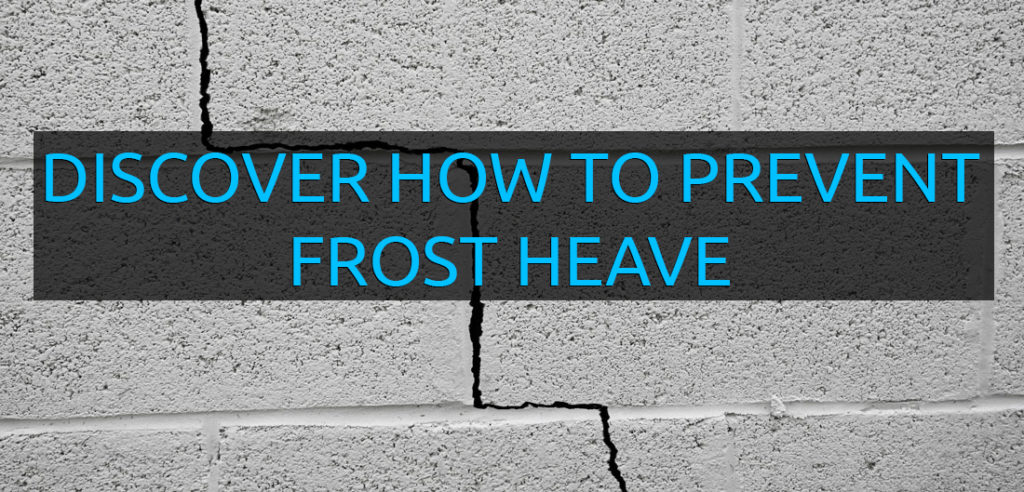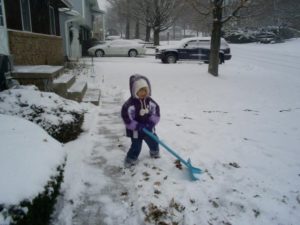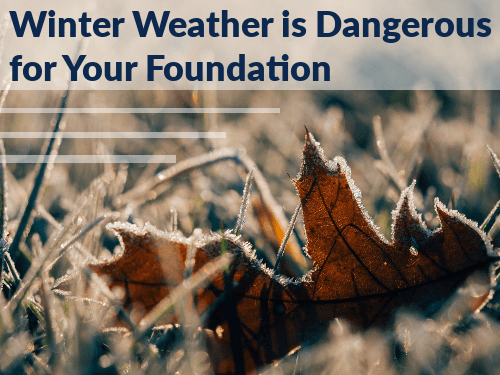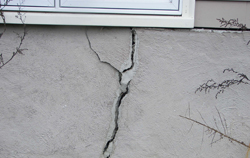



Frost heave occurs when moisture in the soil freezes and expands. As temperatures dip below freezing, the water in the soil turns into ice, causing it to expand. This expansion puts pressure on the surrounding soil, which can push upward and outward, disturbing anything above it, including your foundation. The force of this swelling can result in cracks, bowing foundation walls, and shifts in your slab. If you notice these signs, we recommend that you consult a foundation repair specialist as soon as possible .
Frost heave doesn’t just cause aesthetic damage. The pressure from the expanding ice can affect the structural integrity of your home. Over time, the continued expansion and contraction of the soil can lead to significant foundation issues, such as:
If these issues are visible in your home, it’s important to seek professional help before any damage worsens.
At Tarheel Foundation Solutions, we specialize in identifying and solving foundation problems caused by frost heave. Our team of experts can assess your unique foundation issues and recommend a tailored solution to protect your home.
We offer a variety of repair options, depending on the extent of the damage:
Whether you’re dealing with minor cracks or major foundation movement, we have the tools and expertise to restore your home’s foundation to its original stability. Our team is committed to ensuring that frost heave doesn’t cause long-term issues for your home.
Don’t wait until frost heave has caused irreversible damage to your home. Contact Tarheel Foundation Solutions today to schedule an inspection. Our specialists will carefully evaluate your foundation, diagnose any frost heave concerns, and provide a customized solution designed to prevent future issues. We are here to help and look forward to restoring your foundation to a level of stability that will ensure your home remains safe and secure for years to come.


Winter is here, and freezing temperatures can wreak havoc on your home’s foundation. If you live in a colder climate, you’ve likely heard about the dangers of cracked foundations and the costly repairs they can bring. But did you know that one of the biggest culprits is a phenomenon called frost heaving? Understanding what it is—and how to prevent it—can save your home from structural damage and your wallet from expensive fixes.
Frost heaving occurs when freezing temperatures penetrate the ground, causing the water in the soil to freeze and expand. This expansion can push up the ground beneath your home, pavement, or other structures, leading to cracks, leaks, and uneven surfaces. It’s a slow but powerful force of nature that can seriously damage foundations.
Your foundation could be at risk even before temperatures hit the freezing point. If the temperature drops below 40°F for three consecutive days, the chances of foundation damage increase significantly.
Frost heaving can damage your foundation in two major ways:
The result? Costly repairs to fix cracked walls, misaligned doors, and weakened structural integrity.
While frost heaving can’t be eradicated entirely, there are effective ways to reduce its impact. Prevention focuses on keeping water out of the soil and reducing frost penetration. Here are a few tips:
Foundation damage caused by frost heaving isn’t always obvious at first, but there are key signs to watch for that indicate it’s time to call a professional. Look out for:
If you notice any of these issues, don’t ignore them. Frost heaving damage can worsen quickly, leading to more extensive and costly repairs. Acting early is the best way to protect your home’s stability.
At Tar Heel Foundation Repair, we’re not just experts in frost-heaving solutions—we offer a full range of services to keep your home safe and secure. Whether you need foundation repair, crawl space encapsulation, or assistance with new construction, our team has the experience and tools to handle it all.
Protect your home from frost heaving and beyond. Visit our Contact Page to schedule an inspection and see how we can help with all your foundation and structural needs!
Frost heave damage is a serious concern for homeowners, especially in regions where snow and freezing temperatures are uncommon. Although winter storms and snow are rare in southern states, unpredictable weather patterns are becoming more common, bringing wintry weather further south than usual. While the snow can create a serene winter landscape, it also hides a potential threat to your home’s foundation. The freezing and thawing cycles beneath snow and ice can lead to frost heave, a problem that can cause significant foundation damage if not properly managed.
Frost heave occurs when moisture in the soil freezes and expands, pushing portions of the foundation upward while leaving others in place. This uneven movement can create cracks, misalign structures, and cause long-term damage to your home. When temperatures rise and the ice thaws, the soil settles unevenly, which can lead to further shifting and instability. Over time, this can result in costly repairs if the problem is not addressed early.


Although you can’t control the weather, you can take proactive steps to minimize the risks of frost heave:
If signs of frost heave damage are present, acting quickly can prevent further deterioration. Foundation repair specialists can provide solutions such as pier systems, slab jacking, and reinforcement techniques to stabilize your home and prevent future movement.
Protecting your foundation from seasonal changes is crucial to maintaining the safety and integrity of your home. If you suspect frost heave has impacted your home, reach out to a foundation repair professional for an inspection and customized solutions.
Tar Heel Foundation Solutions is a full-service specialty foundation pier contractor dedicated to quality, professionalism, flexibility, and affordability. You can find a sample of our foundation repair options here.
For residential foundation repair questions, call Brandon Fender at (803)-818-7194.
For commercial and/or engineered foundation repair questions, call Larry Wittmer at (803)-246-5480.
As the temperature drops, it becomes more and more important for homeowners to be aware of the possibility of cold-weather foundation problems. Wintertime in the Carolinas often consists of widely varied day-to-day temperatures and mixed precipitation (rain, snow, sleet, etc). The variation in temperatures and moisture content of the soil can result in a few different problems that affect the foundation of your home.
This is what happens when the soil is pushed upward due to underground ice. Frost heaving is often responsible for roads buckling and cracking in the winter months and can cause the same issues in your foundation. This winter phenomenon requires cold temperatures, as it is caused by the formation of “ice lenses” below the surface soil.


Similar to frost heaving is the possibility of frozen soil pressure. If the soil around and under your home becomes saturated with water and then freezes, it can expand up to 5 percent its original volume. The expanded soil puts pressure on the above or nearby foundation, pushing in all directions (unlike ice lenses, which typically exert pressure only upwards). This expansive pressure causes the foundation to shift or heave and can lead to bowing and leaning walls and cracked bricks or masonry. In addition, a recurring freeze-thaw cycle, in which the temperature drops and rises repeatedly could cause the foundation to successively heave and settle in response to changing soil moisture content and soil pressure.
Now is the time to get your home ready for the cool winter temperatures and harsh rain and sleet. Even if you take all of the right steps to winterize your home, there is still a chance that foundation cracks and heaving can occur.
If your foundation does suffer some sort of damage from frost heave or the added pressure of frozen soils, Tar Heel Foundation Solutions can provide the necessary repairs. Look for the following signs in your foundation this winter to determine if you need professional foundation repair:


These are all foundation problems that may result from the winter conditions in North and South Carolina. If you do see these issues, do not wait to call us. The sooner we can get the problems repaired, the more affordable the repairs will be and the less chance there is of them becoming even worse.
We specialize in the installation of helical piers and slab piers to relevel and stabilize settled or cracked foundations. We can also install soil nails and helical tiebacks to reposition bowing and bulging walls. Our team uses quality products from ECP (Earth Contact Products) to ensure long-lasting repairs. Keep us in mind for all of your winter-weather foundation problems this year.


While the weather is still nice, you need to check your gutters and downspouts. Make sure they are free of leaves and other debris, so they can flow correctly. A clogged drainage system will allow ice dams and icicles to build, causing water to pool closer to your foundation than is comfortable. This is one of the few home fixes that costs nothing other than your time and the energy to climb a ladder. (Unless you want to pay the neighbor kid!)
A pipe that freezes will split or burst and then you have to deal with it in freezing temperatures. Broken pipes are bad enough in warm weather, now imagine dealing with them in ice-cold water in January! Make sure that any pipes that run through unheated portions of your home are insulated and protected. If pipes run along the outside walls of your home, make sure closet and cabinet drawers are open, to allow the heat of your home to keep them warm.
A small leak in a damaged pipe may go unnoticed until it causes a big problem or you can’t figure out why your water bill has jumped. A big leak may cause you to lose a water source while causing damage to your home. In addition to flooding, if water gets into cracks and freezes, it can cause the crack to widen, causing more damage.
There are many steps you can take to keep your home warm and safe during the winter. Depending on the age of your home you may want to do some or all of the following winterizing tips:
A little prep time before the cold sets in will save you in energy costs and keep your home comfortable.
As much as we’d like to stay inside during the winter, we do have to venture out on occasion. Make sure you are ready to clear the snow. You can do it yourself with a snow shovel or snow thrower. Don’t wait until the first foot-deep snowfall to find out your shovel is broken or your snowblower won’t start. Also keep a couple of bags of salt or sand on hand, to keep people from slipping on ice-covered sidewalks or steps. If you need to arrange for a snow removal service, you need to have that set up before the cold weather starts.
By preparing your home for the winter you should be able to relax in the warm comfort of your home. However, if you do have any foundation problems, we can assist you, no matter what the weather is like. Call us today to learn more about we can help you with winter foundation repairs.